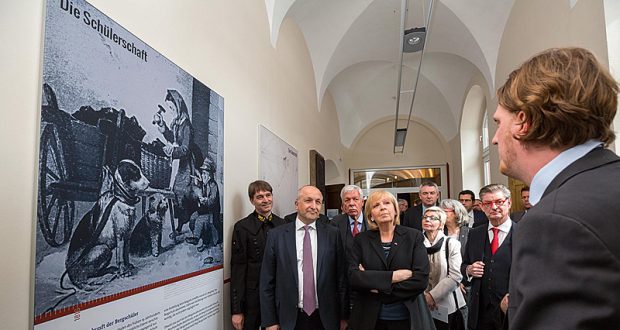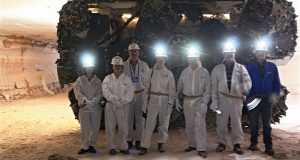On 15th April 1816, the first 14 students began their studies in “mining sciences” at the Bochumer Bergschule (Bochum School of Mining). This central training institute for the coal mining industry gave birth to today’s Technische Hochschule (TH) Georg Agricola. In a ceremony held on 15th April 2016, Hannelore Kraft, Minister-President of the state of North Rhine-Westphalia, Dr. Werner Müller, Chairman of the RAG-Stiftung, Peter Schrimpf, Chairman of the university council and board member of RAG Aktiengesellschaft, and Michael Vassiliadis, Chairman of the IG BCE trade union, paid tribute to the development of the most long-standing university in the Ruhr region. Together with Prof. Dr. Jürgen Kretschmann, President of the university, the Minister-President unveiled the new logo of the university, which has changed its name to mark the anniversary. The change in name from “Technische Fachhochschule Georg Agricola” to “Technische Hochschule Georg Agricola” represents its development from an Institute of Technology to a diverse University of Applied Sciences which strives to be a leading light in engineering research and teaching.
In his speech, Prof. Kretschmann looked back on two centuries of the university’s history and set out the university’s vision for the future: “The THGA feels indebted to the intellectual legacy of the German coal mining industry. This is the foundation upon which the university grew from a regional establishment to an institution of national and international significance. We want to use our knowledge to answer questions on sustainability, occupational safety and even social justice.”
The TH Georg Agricola was founded by the state of Prussian in 1816. From 1864, it was supported by companies from the coal mining industry, who co-founded the Westfälische Berggewerkschaftskasse (Westphalian Miners’ Union) fund for this purpose. In 1990, this role was taken over by the TH’s current supporting organisation, the DMT-Gesellschaft für Lehre und Bildung (Deutsche Montan Technologie Association for Teaching and Training). Since 1971, the TH has been part-financed by the federal state of North Rhine-Westphalia.
The Minister-President, Hannelore Kraft, emphasised the importance of the TH within the North Rhine-Westphalian higher education landscape: “The quality education provided by the TH was a key foundation for the industrial boom in the Ruhr – the incredible rise of an agricultural region on the Ruhr to the industrial heartland of Germany. For many of its students, studying at this university signified advancement through education here in the Ruhr. The TH Georg Agricola is a key component in the densest higher education landscape in Europe.”
Like RAG Aktiengesellschaft, the RAG-Stiftung also supports the TH. Dr Werner Müller, Chairman of the RAG-Stiftung, explained why the RAG-Stiftung is keen to support the future development of the TH beyond the end of Germany’s active coal mining industry: “Even when coal mining has come to an end there will still be projects in which the TH will make a significant contribution towards finding the right solution. In order to do this, the university will bring together a team of specialist staff to not only preserve the knowledge of mining but also further develop it for future generations.”
Peter Schrimpf, Deputy Chairman of the Board at RAG Aktiengesellschaft and, since 2006, Chairman of the TH Georg Agricola university council, called the TH a “gem in the Bochum higher education landscape”: “With its constant willingness to change and adapt, the TH Georg Agricola has met the challenges of its time and responded both innovatively and productively. For this reason it will continue to play a prominent role for the region.”
As a central training institute for mining, the TH has also long been associated with the German Trade Union for Mining, Chemicals and Energy (IG BCE). Michael Vassiliadis, Chairman of the union, also congratulated the TH on its anniversary: “Teaching and research play a key role in developing a society worth living in. The TH has been making a valuable contribution towards achieving this goal for 200 years and will therefore also play an active role in shaping the future.”
About 400 guests from all areas of public life took part in the ceremony, including Carina Gödecke, President of the Landtag (state parliament), Garrelt Duin, NRW Minister of Economic Affairs, Volker Milk, District Vice President of the Arnsberg District, Thomas Eiskirch, Mayer of Bochum, Bernd Tönjes, Chairman of the Board at RAG AG and Prof. Dr. Vladislav Kecojevic of West Virginia University (USA), Chairman of the International Society of Mining Professors. The teachers, staff and students of the TH also celebrated their university’s great anniversary.
A historic exhibition (Fig. 1) at the TH, open until the end of 2016, offers a glimpse behind the scenes of the oldest university in the Ruhr: Old teaching materials, geological finds, maps and class photos trace the journey of the mining school from its beginnings to the present day. Visitors to the historic classroom take a little journey through time – with interesting and sometimes curious insights into the daily teaching routines from 1816 to today. (THGA/Si.)


